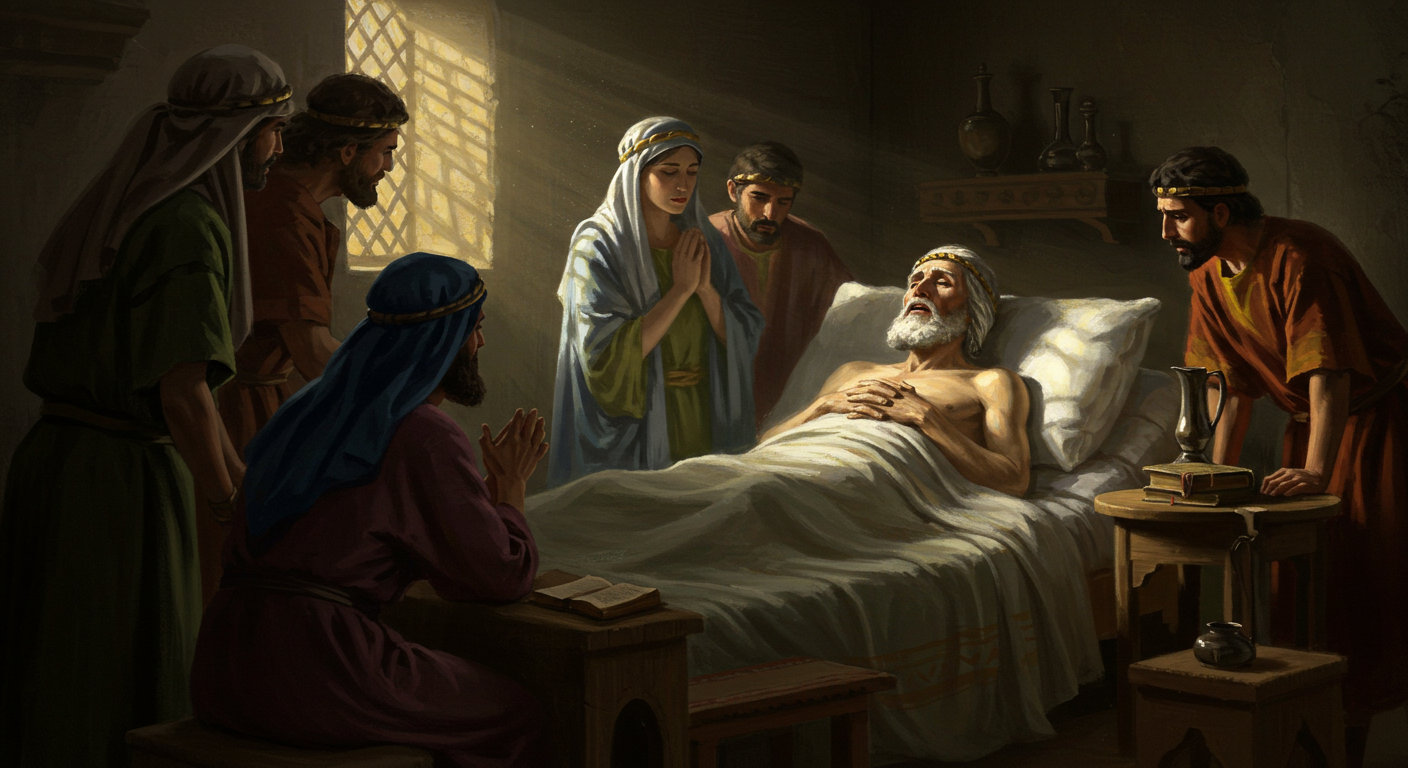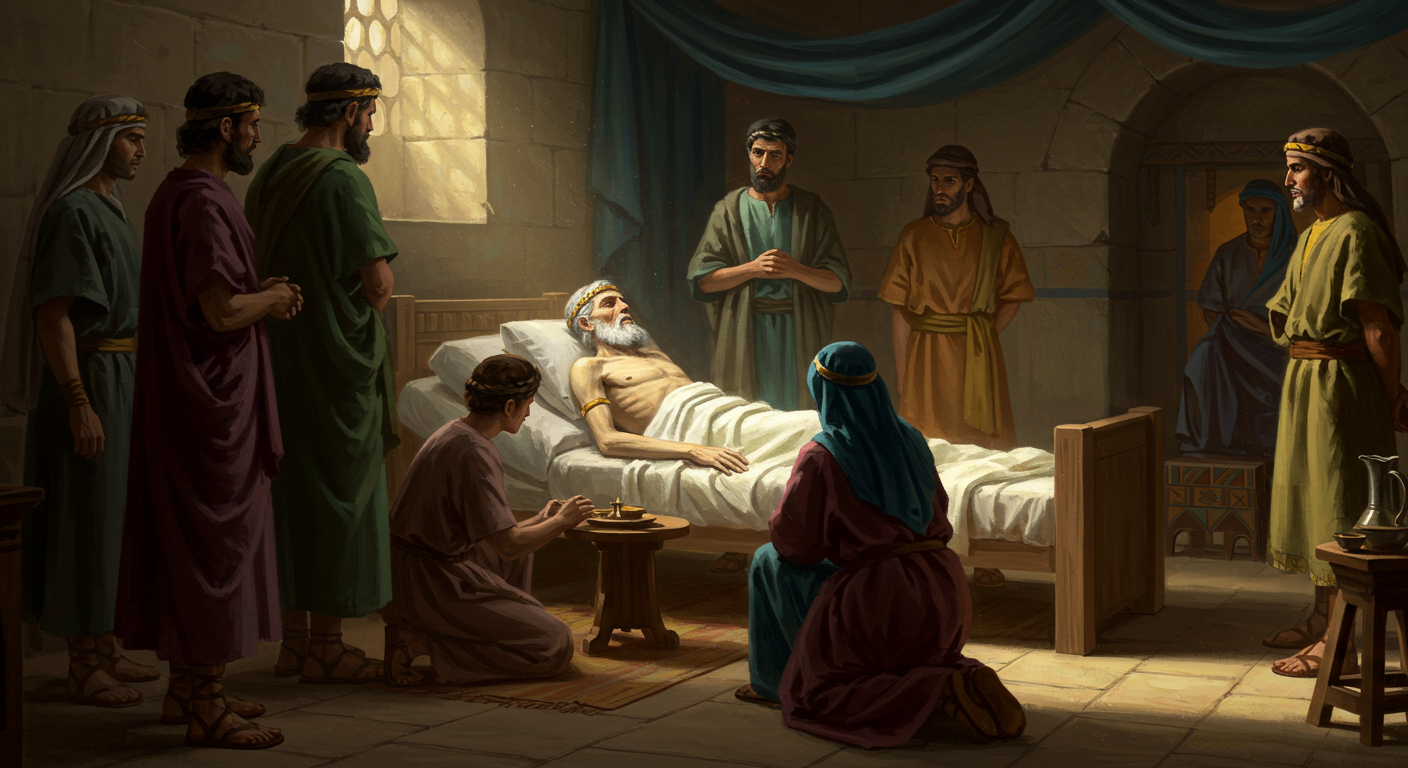When Hezekiah prayed, heaven moved. Discover how prayer extended his life and shaped history.
Hezekiah’s Prayer for Healing – 2 Kings 20:2–3, Isaiah 38:2–3

Introduction
Imagine finding yourself at the brink of death, faced with the divine proclamation that your time on Earth is coming to an end. In such a moment, what emotions would you feel? What would your heart cry out for? In the annals of biblical history, there is a powerful story about a prayer of desperation intertwined with faith, fervor, and a miraculous outcome. This is the story of Hezekiah’s prayer for healing, found in 2 Kings 20:2-3 and Isaiah 38:2-3.
In this article, we will explore the profound depths of Hezekiah’s prayer, unraveling its historical context, its key components, and the lessons it offers those seeking faith in modern times. We will also draw parallels between this prayer and others found within the Bible and suggest ways you can incorporate these principles into your daily life. By the end, we hope you feel inspired to deepen your prayer journey.
Background of the Prayer
During a tumultuous period in Judah’s history, King Hezekiah emerged as a devout and reformative leader. He ruled during a time when superstitions and idols plagued the land, yet he remained steadfast in his commitment to Yahweh, advocating for a return to moral and spiritual integrity. It was in the fourteenth year of Hezekiah’s reign when he faced an existential crisis.
Having fallen gravely ill, the message delivered by the prophet Isaiah was a stark reminder of his mortality: “Put your house in order, because you are going to die; you will not recover.” Imagine the weight of those words, spoken by a trusted prophet. It was in this desperate moment, when hope seemed lost, that Hezekiah turned to God in prayer, seeking both healing and divine intervention.
Key Elements of the Prayer
Hezekiah’s prayer, while brief, is layered with emotion and vulnerability. His response to Isaiah’s prophecy was immediate and visceral. In 2 Kings 20:2-3, we read that he “turned his face to the wall” and prayed to the Lord. This act of turning away signifies a deeply personal and earnest conversation with God, focused and undistracted by the world around him.
Sincerity and Passion
Hezekiah’s prayer is a testament to the power of sincere supplication. He pours out his heart before God, reminiscent of David’s psalms when faced with adversity. By highlighting his past devotion, “Remember, Lord, how I have walked before you faithfully and with wholehearted devotion and have done what is good in your eyes,” Hezekiah earnestly presents his case with authenticity and vulnerability.
Acknowledgment of Faithfulness
In acknowledging his faithfulness, Hezekiah is not boasting but humbly reminding God of his steadfastness. This act reveals a deep understanding of his relationship with the Divine—one that values humility in the form of respectful reminding, rather than entitlement.
Lessons We Can Learn
From Hezekiah’s prayer, several spiritual principles emerge that resonate through time and circumstance.
Faithful Living as a Foundation
Hezekiah’s life of faithful devotion demonstrates the importance of living a life aligned with spiritual promises and covenants. His plea for healing is built on a foundation of obedience and commitment, reminding us of the correlation between our daily walk with faith and how we approach God in times of need.
Power of Earnest Prayer
Hezekiah’s unwavering belief in the power of prayer illustrates the divine possibility of change through sincere petitions. It highlights the strength inherent in turning to God with our burdens, free of pretense and full of honest desire.
Trust in Divine Timing
While immediate results can seem out of reach, the story of Hezekiah reassures us of the importance of trusting in divine timing. The fifteen-year extension of his life is a testament to God’s sovereign control over human affairs, urging us to trust that His plans outweigh any human understanding.

Similar Prayers in the Bible
The Bible is replete with prayers that mirror the themes found in Hezekiah’s earnest plea. A similar prayer with profound implications is Solomon’s request for wisdom in 1 Kings 3:9, where he prioritizes understanding over personal gain. Both prayers reflect deep relationships with God, centered on humility, wisdom, and obedience.
The lamentation and eventual comfort of Psalm 6 echoes the desperate cry of Hezekiah. King David’s plea for mercy in times of distress underscores the human condition’s vulnerability—themes familiar in Hezekiah’s supplication for divine favor and healing.
How to Apply This Prayer Today
Incorporating the essence of Hezekiah’s prayer into contemporary life can enrich our spiritual practice.
Personal Application
When faced with illness or life’s challenges, you can adopt Hezekiah’s approach of direct and sincere prayer. Trust that your past devotion has not gone unnoticed. Whether it’s a health crisis or decision-making, let your prayer be one of honesty and faithful expectation.
Community Application
On a larger scale, this prayer can be applied to communal challenges or aspirations. As a community grapples with growth or adversity, Hezekiah’s sense of turning toward God for guidance provides a blueprint for seeking collective divine intervention toward revitalization or healing.
Related Bible Verses
To delve deeper into the themes of healing and prayer observed in Hezekiah’s plea, several biblical verses come to mind:
- God’s Healing Power: James 5:15 affirms the prayer offered in faith will make the sick person well.
- Divine Mercy: Psalm 103:2-3 reminds us of God’s merciful nature, forgiving sins and healing diseases.
- Trustful Prayer: Philippians 4:6-7 emphasizes seeking God in prayer with thanksgiving, rather than succumbing to anxiety.
Closing Thoughts
Hezekiah’s prayer for healing is a timeless narrative that underscores the power of earnest faith and divine intervention. In a world of uncertainties, it serves as a beacon of hope, encouraging you to lean into prayer with heartfelt sincerity and trust in God’s plan for your life. As you reflect on this powerful story, consider ways to deepen your personal prayer journey and invite God’s transformative power into your life.
May you be inspired to turn to God with the same intimate devotion that marked Hezekiah’s life. May this story spur you to seek both personal and communal healing through earnest supplication.







